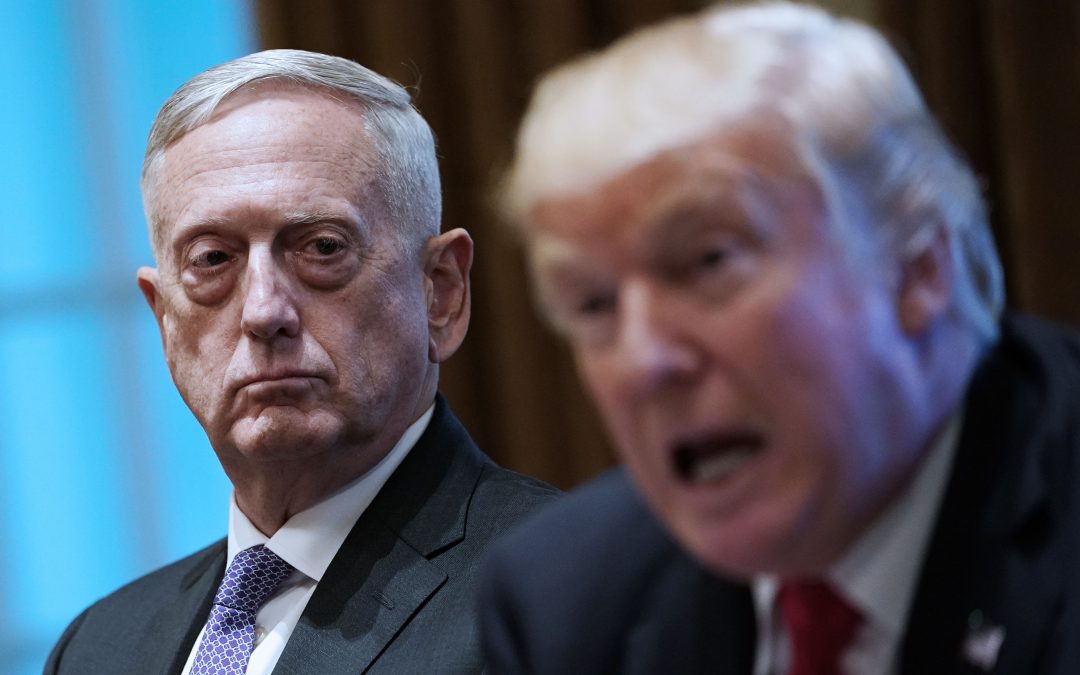Less than two hours after Defense Secretary Jim Mattis went to the White House on Thursday to hand a resignation letter to President Trump, the president stood in the Oval Office and dictated a glowing tweet announcing that Mattis was retiring “with distinction” at the end of February.
But Trump had not read the letter.
As became apparent to the president only after days of news coverage, a senior administration official said, Mattis had issued a stinging rebuke of Trump over his neglect of allies and tolerance of authoritarians.
Trump grew increasingly angry as he watched a parade of defense analysts go on television to extol Mattis’s bravery, another aide said, until he decided today that he had had enough.
In a tweet later this morning, Trump announced that he was removing Mattis from his post by Jan. 1, two months before the defense secretary had planned to depart.
Trump said that Patrick M. Shanahan, Mattis’s deputy and a former Boeing executive, would serve as the acting defense secretary, praising him as “very talented” and adding that “he will be great!”
Trump’s sudden announcement that he was firing a man who had already quit was the exclamation point to a tumultuous week at the Pentagon, where officials have been reeling from day after day of presidential tweets announcing changes in American military policy.
Mattis had wanted to stay through a NATO defense ministers meeting scheduled for February, hoping to enshrine recent moves by the alliance to bulk up its security compact as a bulwark against Russia.
But Mattis’s resignation letter did him no favors on that count: It had become hard to envision how he could continue for two months to represent a president whose own views toward Russia are far more benign.
As it became clear that the two men’s ideas of how to treat both friends and adversaries were so publicly at odds, the White House decided that there would be no reason for Mattis to stay on during what two officials called his “lame duck” period.
Officials in allied nations, who had already expressed unease over Mattis’s resignation, voiced exasperation over his hastened departure.
“And now Trump gets rid of SecDef Mattis almost immediately,” Carl Bildt, a former prime minister of Sweden, wrote on Twitter. “No smooth transition. No effort at reassurance to allies. Just vindictive.”
Even as he accelerated Mattis’s exit, Trump seemed to suggest a slower one for the 2,000 troops in Syria — a drawdown he announced last week over Mattis’s objection
. On Twitter, Trump said that he had spoken with President Recep Tayyip Erdogan of Turkey that morning to discuss “the slow and highly coordinated pullout of U.S. troops from the area.”
Just days ago, Trump declared victory over the Islamic State and said that troops would be pulled out immediately.
“They’re all coming back,” Trump said in a video broadcast on Wednesday, “and they’re coming back now.”
Today, a senior administration official would not say what that ultimately meant for the timetable for troops in Syria, but said the president had reiterated to MErdogan that the United States would remain there long enough to ensure an orderly handover and “help out logistically” to eradicate any territory still held by the Islamic State.
The official spoke amid reports that Turkey was moving troops near a town in northern Syria held by Kurdish allies of the United States, even though Turkey had said it would put off a promised offensive after Trump’s hasty decision to leave Syria.
Mattis resigned on Thursday in large part over that pullout order.
The defense secretary was also upset about Trump’s decision to bring home half of the 14,000 American troops stationed in Afghanistan and his order to deploy American troops to the border with Mexico.
The president has grown increasingly angry as commentators have described Mattis in near heroic terms for standing up to Trump and making his resignation count as no one else in the president’s circle has done, an aide said.
On Saturday, Trump took a jab at Mattis on Twitter, saying that “when President Obama ingloriously fired Jim Mattis, I gave him a second chance. Some thought I shouldn’t, I thought I should.”
Mattis, a retired four-star general, led the United States Central Command, which oversees military operations in the Middle East and Southwest Asia, from 2010 to 2013.
His tour there was cut short by the Obama administration, which believed he was too hawkish on Iran.
By Sunday morning, Mike Pompeo, the secretary of state, had informed Mattis that he would have just over another week in his current job.
Pompeo and John R. Bolton, the president’s third national security adviser since taking office, are left to direct policy while the president considers an official replacement for Mattis.
